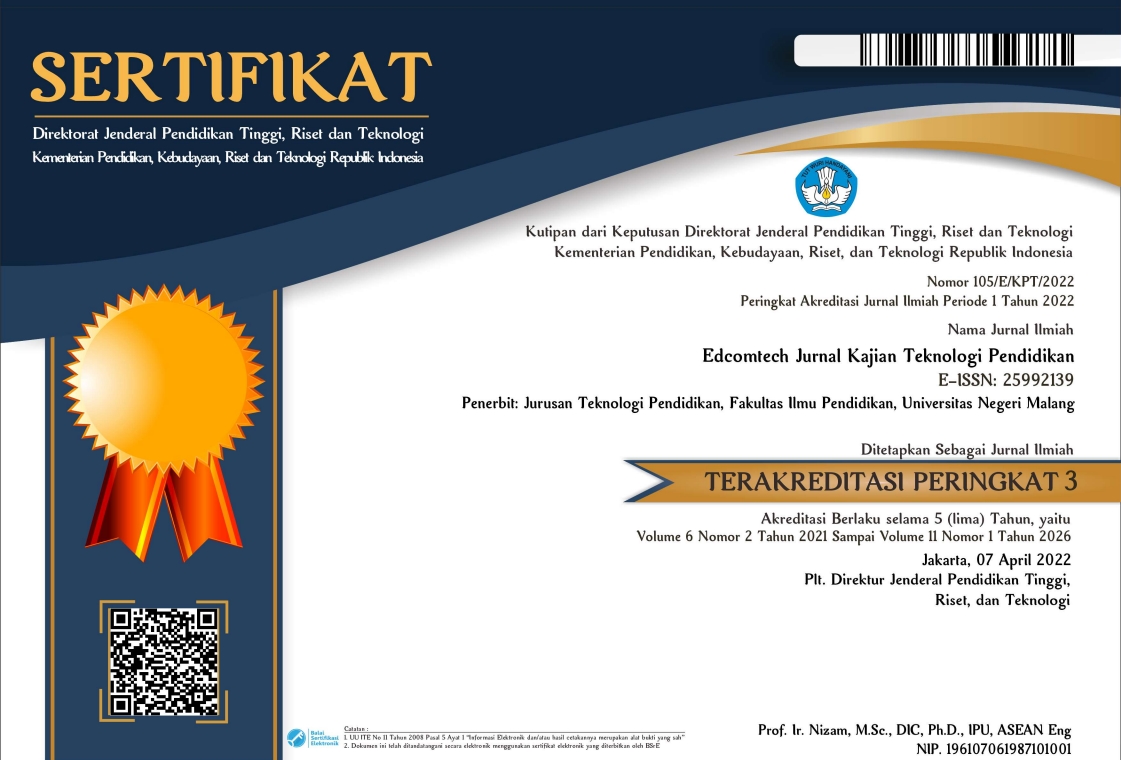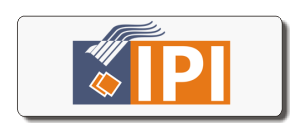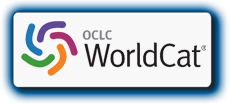Pengaruh Penggunaan Metode Pembelajaran Moral dan Tingkat Religiusitas Terhadap Peningkatan Pertimbangan Moral
Abstract
Abstrak: Penggunaan metode pembelajaran moral yang sesuai akan lebih mampu meningkatkan pertimbangan moral mahasiswa. Penelitian ini termasuk penelitian eksperimen dengan desain eksperimen factorial 2 x 2. Subjek penelitian ini adalah mahasiswa fakultas Ilmu Tarbiyah dan Keguruan UIN Maliki Malang jurusan PGMI semester dua. Jumlah mahasiswa sebagai subjek penelitian adalah 159 mahasiswa, terdiri dari kelas; IIA, IIB, IIC,IID. Penentuan kelas yang menjadi subjek penelitian dilakukan secara acak, Prosedur acak dilakukan dalam dua tahapan, yaitu random selection dan random assignment. Penelitian dilaksanakan pada rentang waktu 8 kali pertemuan yakni 18 Maret sampai dengan 6 Mei 2013. Hasil penelitian menunjukkan bahwa (1) tingkat pertimbangan moral mahasiswa yang diajar dengan menggunakan metode diskusi dilema moral berbeda secara signifikan, bila dibandingkan dengan mahasiswa yang diajar dengan metode ceramah tanya jawab. (2) Tingkat pertimbangan moral subjek religiusitas tinggi berbeda secara signifikan, bila dibandingkan dengan subjek religiusitas rendah. (3) Tidak terdapat interaksi antara penggunaan metode dengan religiusitas terhadap tingkat pertimbangan moral mahasiswa.
Abstract: The use of appropriate moral learning methods will be better able to improve students' moral considerations. This research is an experimental research with a 2 x 2 factorial experimental design. The subjects of this study were students of the Faculty of Tarbiyah and Teacher Training, UIN Maliki Malang, majoring in the second semester of PGMI. The number of students as research subjects was 159 students, consisting of classes; IIA, IIB, IIC, IID. The determination of the class to be the research subject was carried out randomly. The random procedure was carried out in two stages, namely random selection and random assignment. The study was conducted in a span of 8 meetings, namely March 18 to May 6, 2013. The results showed that (1) the level of moral consideration of students taught using the moral dilemma discussion method was significantly different, when compared to students taught using the question-lecture method. answer. (2) The level of moral consideration in the subject of high religiosity is significantly different, when compared with the subject of low religiosity. (3) There is no interaction between method use and religiosity towards the level of student moral considerations.
Keywords
Full Text:
PDFReferences
Adebayo., S.O. 2011. Effect of religiousity and occupation on moral reasoning: a study of Nigerian Adult Sample. British Journal of Arts and Social Sciences, (3), 2. 253-264.
Allen Edwards, L. 1979. Techniques of Attitude Scale Construction. New York: Appleton Century Crafts inc.
Ardhana, W. 1985. (a) Keefektifan pendidikan moral berdasarkan beberapa bukti empiric. Makalah dibacakan pada pidato di depan sidang Senat Terbuka FIP IKIP Malang. Malang, 14 Agustus 1985.
Ardhana, W. 1982. (b) Beberapa Metode Statistik Untuk Penelitian Pendidikan. Surabaya: Penerbit Usaha Nasional.
Ardhana, W. 1987. Bacaan Pilihan Dalam Metode Penelitian Pendidikan. Jakarta: P2LPTK-Depdikbud Dirjen Dikti.
Blatt, M., & Kohlberg, L. 1975. The effects of classroommoral discussion upon children’s moral judgment. Journal of Moral Education. Vol 4: 129—161.
Bloom, B. S. (Ed). 1979. Taxonomy of Educationalobyektives. London dan New York: Longman.
Duriez, Bart ., & Soenens, Bart. 2006. Religiousity, moral attitudes and moral competence: a critical investigation of the religiousitymoral relation. International Journal of Behavioral Development, 30 (1), 76-83.
Fr. Abun, Damianus & Dajindosm Riza.2012. The effect of religion toward mpral values of college students in locos Sur, Philippines, E-International Scientific Research Journal, (IV), 3, 2012. ISSN 2095-1749.
Glock,C. Y, & Stark, R. 1965. Religion and Society in Tension. Chicago: Rand Mc. Nally and Co.
Kohlberg, L. 1963. The Development of Children’s Orientation towards a Moral Order. New York: Sagu Foundation
Kohlberg, L., & Turricl. 1971. Moral Development and Moral Education. Dalam: G. Lesser (ed.). Psychology and Educational Practice. Chicago: Scott, Foresman.
Kohlberg, L. 1977. The CognitiveDevelopmental Approach to Moral Education. Dalam Hass Glen (Ed.), Curriculum Planning: A New Approach (2 nd ed.) Boston: Allyn and Bacon, Inc.
Kohlberg, L., & Turricl. 1971. Moral Development and Moral Education. Dalam: G. Lesser (ed.). Psychology and Educational Practice. Chicago: Scott, Foresman.
Kohlberg, L., & Gilligan, C. 1977. Front Adolescent to Adulthood: The Rediscovery of Reality in a Postconventional World. New York: Plenum Press.
Kohlberg, L. 1977. The CognitiveDevelopmental Approach to Moral Education. Dalam Hass Glen (Ed.), Curriculum Planning: A New Approach (2 nd ed.) Boston: Allyn and Bacon, Inc.
Kohlberg, L., & Mayer, R. 1979. Development and Its Implications for Moral Education. Dalam D.B. Cochrane (Ed). The Domain of Moral Education. New York: Paulist Press.
Kohlberg, L. 1980. Educating for a Just Society: Updated and Revised Statement. Dalam Mursey, B. (Ed.), Moral Development, Moral Education, and Kohlberg. Brimingliam, Alabama: Religious Education Press.
Kohlberg, L. 1980. Stages of Moral Development as a Basis of Moral Education. Dalam Mursey, B. (Ed.), Moral Development, Moral Education, and Kohlberg. Brimingliaiii, Alabama: Religious Education Press.
Kohlberg, L. 1984. The Psychology of Moral Development. San Francisco: Harper & Row Publisher.
Refbacks
- There are currently no refbacks.
Copyright (c) 2017 Samsul Susilawati

This work is licensed under a Creative Commons Attribution-ShareAlike 4.0 International License.
Edcomtech: Jurnal Kajian Teknologi Pendidikan published by Department of Educational Technology, Faculty of Education, State University of Malang in Collaboration with Asosiasi Program Studi Teknologi Pendidikan Indonesia (APS TPI) and Ikatan Profesi Teknologi Pendidikan Indonesia (IPTPI) with MoU.
Publisher Address:
Lab. Teknologi Pendidikan, Gd.E2, Lt.1
Fakultas Ilmu Pendidikan Universitas Negeri Malang
Jalan Semarang No 5, Kota Malang Kode Pos 65145
Email: edcomtech.fip@um.ac.id
========================================================================================================
| INDEXED BY | TOOLS | PLAGIARISM CHECK | ARTICLE TEMPLATE |
|

Edcomtech is licensed under a Creative Commons Attribution-ShareAlike 4.0 International License.
Edcomtech Statistics (Since July 13th, 2020)











1.png)








